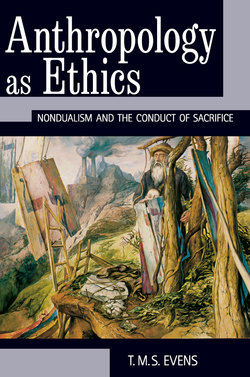Читать книгу Anthropology as Ethics - T. M. S. (Terry) Evens - Страница 7
На сайте Литреса книга снята с продажи.
ОглавлениеACKNOWLEDGMENTS
This book has been many years in the writing, and a great many more in the thinking. Over these years I have benefited from comments (the less than appreciative ones included) of a number of readers. John Caputo, whose work I admire, very kindly agreed to read my interpretation of the biblical story of Abraham's ‘binding’ of Isaac (my chap. 2), although my request to do so came to him out of the blue. Christopher Browning expertly commented on my analysis of the Holocaust (chap. 4), and John McGowan did the same for my critique of Habermas (chap. 6). I feel very fortunate to have as university colleagues these two superb scholars. My departmental colleagues, Arturo Escobar and Peter Redfield, provided thoughtful commentary on my chapters on Foucault (chaps. 11 and 12) and rationality (chaps. 7 and 8), respectively. My old and very dear friend, Jeffrey Obler, a gifted intellectual and teacher, whose recent passing I deeply mourn, carefully read my chapter on the Holocaust (chap. 4), as well as the two excurses on ethics and Derrida (chaps. 3 and 13).
Given the long gestation of this book, earlier versions of many of the chapters have had a number of readers who, in various capacities, provided me with valuable commentary. In this connection, I wish to thank especially my brilliant (now deceased) teacher Mike (M. G.) Smith, my friends Craig Calhoun and Nancy Scheper-Hughes, and my friend and student Steven Klein. What has become the concluding section of chapter 14 sharply benefited from a close, critical reading by my good friend Lee Schlesinger, on whose provocative and perspicacious commentary one can always count. I must also mention the late Godfrey Lienhardt, who upon my request took the time to comment caringly on what is now the chapter on the Dinka (chap. 9), and Steven Lukes, who, in his capacity as a member of a journal editorial board, furnished exceptionally useful comments on what has become the chapter on the Azande (chap. 10). Because previous versions of chapters 5, 8, 9, and 10 have appeared as journal articles,1 I have, in respect of these chapters, benefited from anonymous reviews submitted by readers for the journals.
Earlier renderings of some of the chapters were presented to the Equipe de Recherche d'Anthropologie Sociale of the Ecole des Hautes Etudes en Sciences Sociales. I remain eternally grateful to Louis Dumont, Daniel de Coppet, and Jean Claude Galey for inviting me to their seminaire. Daniel and his wife, the anthropologist Cécile Barraud, were a wonderfully warm and gracious host and hostess during my stay in Paris, and I was terribly saddened to learn of Daniel's sudden death. I need also thank the following institutions, where I delivered prior versions of a number of these chapters: the Centre for the Study of the Social Sciences, Calcutta; Vishva Bharati University, Santineketan; the Research Colloquium of the Department of Sociology, at the University of Delhi; the Department of Anthropology, University College, London; and my own Department of Anthropology at the University of North Carolina at Chapel Hill. In addition, I am grateful to my university's Institute of Arts and Humanities, where during my tenure as a Chapman Fellow, I wrote a substantial portion of my interpretation of the story of Abraham and Isaac (chap. 2). I also wish to thank the many students in my long-standing seminar, “Phenomenology and Anthropology,” who in recent years were forced to read and comment on certain of the chapters of this book, as well as the many more undergraduates who found my course lectures on some of the topics in this book provocative enough to press me to try, and try again, to clarify my ideas.
Lee Diener deserves special thanks for taking on the tedious task of checking my textual references against my bibliography, while she herself was about to deliver a (highly original) project of her own.
Don Handelman and Bruce Kapferer read and commented on a number of the early chapters of this book. I am warmly indebted to both of these outstanding thinkers. My friendship with them runs deep and goes back to our days as fellow graduate students at Manchester University. Were it not for their unstinting encouragement and advice, I cannot help but wonder if this project would ever have seen publication.
I owe a huge debt of gratitude to Christopher Roberts, who magnanimously and scrupulously read critically and in its entirety the penultimate draft of this book. His comments and insights, even when they expressed doubts about my ideas, were invaluable: immensely perceptive, richly knowledgeable, and ever constructive. Indeed, they were so incisive and thoughtfully put that in responding to them, I often found myself employing his vocabulary and phraseology. Although I have credited him specifically in some of the notes, the impact of his close and critical reading greatly exceeds these citations. My argumentation remains involved, but I believe that his comments have helped me immeasurably to bring greater clarity to what I have done here.
Carie Hersh and Tim Elfenbein produced the index between them, and I am obliged to them for their thoughtful, painstaking labors. I am also indebted to Marion Berghahn for her independence and willingness to publish a work that sits squarely between anthropology proper and philosophical deliberation. Finally, I remain grateful to Shawn Kendrick for her splendid copy-editorial work. It is my belief that her conscientious, engaged, and intelligent reading; her clear eye for problems of grammar, consistency, and usage; and, above all, her concern that the interested reader be able to comprehend the text have helped to make a highly complex argument more accessible than it would otherwise be. Needless to say, for the final result, the eminent intellectual inspirations all the same, and whatever the defects, I must take responsibility.
